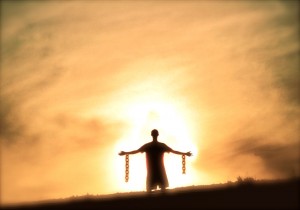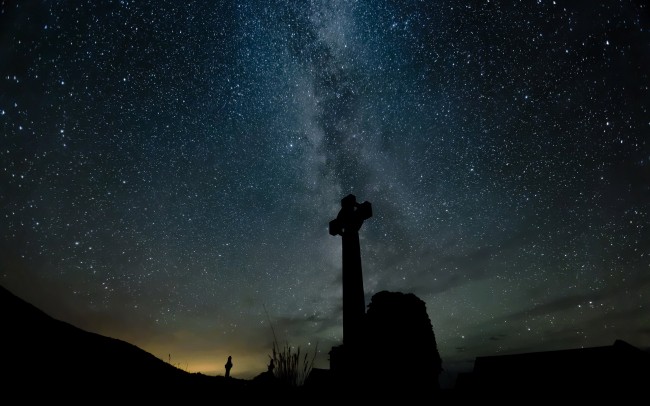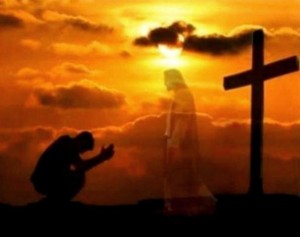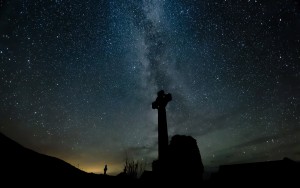You have tested my thoughts and examined my heart in the night. You have scrutinized me and found nothing wrong. (Psalm 17:3)
 Do you wish you could say that? That the LORD God has come to you in the night and found in you nothing wrong? What is it about the night?
Do you wish you could say that? That the LORD God has come to you in the night and found in you nothing wrong? What is it about the night?
They lie awake at night, hatching sinful plots. Their actions are never good. They make no attempt to turn from evil. (Psalm 36:4)
For, behold, the wicked bend the bow, They make ready their arrow upon the string To shoot in darkness at the upright in heart. (Psalm 11:2)
Violent enemies are hiding in every dark corner of the earth. (Psalm 74:20)
There’s just a few of the things we do in the dark, and because it is dark, we begin to think that: “The Lord isn’t looking,” they say, “and besides, the God of Israel doesn’t care.” (Psalm 94:7)
Sometimes we get stuck in the darkness: Some of you were prisoners suffering in deepest darkness and bound by chains. (Psalm 107:10)
Admit it or not, we intuitively know: If I say, “Surely the darkness will overwhelm me, and the light around me will be night,” Even the darkness is not dark to You, and the night is as bright as the day. Darkness and light are alike to You. (Psalm 139:11,12)
But then something wondrous happens: “Awake, sleeper, and arise from the dead, and Christ will shine on you.” (Ephesians 5:14)
 For once you were full of darkness, but now you have light from the Lord. So live as people of light! For this light within you produces only what is good and right and true. Carefully determine what pleases the Lord. Take no part in the worthless deeds of evil and darkness; instead, expose them. (Ephesians 5:8-11)
For once you were full of darkness, but now you have light from the Lord. So live as people of light! For this light within you produces only what is good and right and true. Carefully determine what pleases the Lord. Take no part in the worthless deeds of evil and darkness; instead, expose them. (Ephesians 5:8-11)
What do your thoughts turn to at night? What do your actions betray? Whether gossip or greed, pride or porn, deception or destruction, don’t be what you were, be who you are in Christ—day and night.
Or do you not know that the unrighteous will not inherit the kingdom of God? Do not be deceived: neither the sexually immoral, nor idolaters, nor adulterers, nor men who practice homosexuality, nor thieves, nor the greedy, nor drunkards, nor revilers, nor swindlers will inherit the kingdom of God. And such were some of you. (1 Corinthians 6:9-11)

 We now see the result of being lifted up—in plain sight—on a rock. It’s not a matter of sight; rather it is a matter of power. He has been exalted, set on high, over his enemies. Yes they do indeed surround David, but it is of no consequence, because He is the one with power and authority, not they. And David knows full well where that power and authority come from.
We now see the result of being lifted up—in plain sight—on a rock. It’s not a matter of sight; rather it is a matter of power. He has been exalted, set on high, over his enemies. Yes they do indeed surround David, but it is of no consequence, because He is the one with power and authority, not they. And David knows full well where that power and authority come from. The day of trouble. Sounds ominous. And the Hebrew word for trouble has darker translations: calamity, disaster, and wickedness are the three most used. Here are the other occurrences of this specific phrase.
The day of trouble. Sounds ominous. And the Hebrew word for trouble has darker translations: calamity, disaster, and wickedness are the three most used. Here are the other occurrences of this specific phrase.
 So what’s the context here? Why did God come down? We begin in verse 6:
So what’s the context here? Why did God come down? We begin in verse 6:
 You ever wonder about the personal pronouns in the Bible? They are there for several reasons (and not just grammatical), and here are a few:
You ever wonder about the personal pronouns in the Bible? They are there for several reasons (and not just grammatical), and here are a few: distance between heaven and earth as an illustration of how great God’s mercy is. And the distance between east and west, an illustration of how far God has removed our sin from us.
distance between heaven and earth as an illustration of how great God’s mercy is. And the distance between east and west, an illustration of how far God has removed our sin from us.
 Here is the next verse which also reveals the scope of His actions.
Here is the next verse which also reveals the scope of His actions. How great is His lovingkindness (mercy)? For as high as the heavens are above the earth. This shows how lofty His nature, and how low He will stoop for us to receive His mercy.
How great is His lovingkindness (mercy)? For as high as the heavens are above the earth. This shows how lofty His nature, and how low He will stoop for us to receive His mercy. It’s easy to understand why the Pharisees we so comfortable with their religion—they believed they had a lock on access to the One True God. The also believed they had a lock on the location: For now I have chosen and consecrated this house that My name may be there forever, and My eyes and My heart will be there perpetually. (2 Chronicles 7:16)
It’s easy to understand why the Pharisees we so comfortable with their religion—they believed they had a lock on access to the One True God. The also believed they had a lock on the location: For now I have chosen and consecrated this house that My name may be there forever, and My eyes and My heart will be there perpetually. (2 Chronicles 7:16) We see, as Christ said, that salvation comes through the Jews, it starts with the Jews. But it’s no longer about the Mosaic ritual; rather it’s about worshiping in spirit and truth, for God is spirit. Those who will worship in spirit and truth Lord may do so from any where. This was great news for the Samaritans (see John 4:39-42) and for us Gentiles. This then gives a different interpretation to the above passage from Psalm 86. We can now come and worship before You, O Lord, any where and at any time. This is what Christ has accomplished for us. Why not worship Him now?
We see, as Christ said, that salvation comes through the Jews, it starts with the Jews. But it’s no longer about the Mosaic ritual; rather it’s about worshiping in spirit and truth, for God is spirit. Those who will worship in spirit and truth Lord may do so from any where. This was great news for the Samaritans (see John 4:39-42) and for us Gentiles. This then gives a different interpretation to the above passage from Psalm 86. We can now come and worship before You, O Lord, any where and at any time. This is what Christ has accomplished for us. Why not worship Him now? 40 years ago I was in a Bible study with the pianist from the Christian band Glad, Bob Kauflin, and occasionally he’d teach us some new songs. One that he taught us was the above Psalm. I can still sing and play it, but I don’t know who wrote the music.
40 years ago I was in a Bible study with the pianist from the Christian band Glad, Bob Kauflin, and occasionally he’d teach us some new songs. One that he taught us was the above Psalm. I can still sing and play it, but I don’t know who wrote the music.